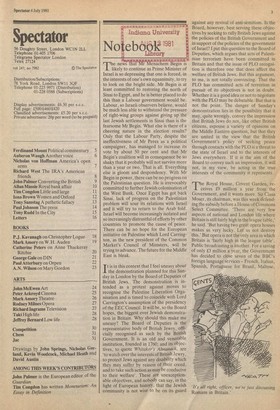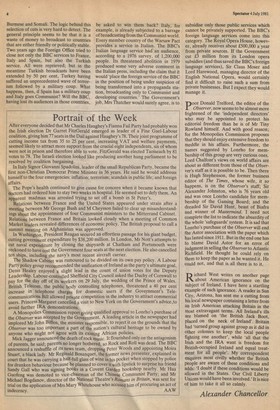gt 00000000:,=000::40 . ,..101-.001% A Indiana University 0
raw
gsej rTI he net Wirttretiae er"r?Te*gin is 1 likely to continue as Prime Minister of Israel is so depressing that one is forced, in the interests of one's own equanimity, to try to look on the bright side. Mr Begin is at least committed to restoring the north of Sinai to Egypt, and he is better placed to do this than a Labour government would be. Labour, so Israeli observers believe, would be much less able to withstand the pressure of right-wing groups against giving up the last Jewish settlements in Sinai than is the fearsome Mr Begin. What else is there of a cheering nature in the election results? Only that the Labour Party, despite the ineffectiveness of Mr Peres as a political campaigner, has managed to increase its vote by about 50 per cent and that Mr Begin's coalition will in consequence be so shaky that it probably will not survive more than a year or two. That is all. Everything else is gloom and despondency. With Mr Begin in power, there can be no progress on the Palestinian question. He is irrevocably committed to further Jewish colonisation of the West Bank. Once Egypt has got back Sinai, lack of progress on the Palestinian problem will sour its relations with Israel and it will try to return to the Arab fold. Israel will become increasingly isolated and so increasingly distrustful of efforts by other countries to promote the cause of peace. There can be no hope for the European initiative on Palestine which Lord Carrington, as the new president of the Common Market's Council of Ministers, will be trying to advance. The future for the Middle East is bleak.
It is in this context that I feel uneasy about the demonstration planned for this Sunday in London by the Board of Deputies of British Jews. The demonstration is intended as a protest against moves to recognise the Palestine Liberation Organisation and is timed to coincide with Lord Carrington's assumption of the presidency of the EEC Council. It will be, so the Board hopes, the biggest ever Jewish demonstration in Britain. Why should this make me uneasy? The Board of Deputies is the representative body of British Jewry, officially recognised as such by the British Government. It is an old and venerable institution, founded in 1760; and its objectives, to quote Whitaker's Almanack, are 'to watch over the interests of British Jewry, to protect Jews against any disability which they may suffer by reason of their creed, and to take such action as may be conducive to their welfare'. These are unexceptionable objectives, and nobody can say, in the light of European history, that the Jewish community is not wise to be on its guard against any revival of anti-semitism. Is the Board, however, best serving these objectives by seeking to rally British Jews against the policies of the British Government and in support of the policies of the government of Israel? I put this question to the Board of Deputies, which argues that acts of Palestinian terrorism have been committed in Britain and that the issue of PLO recognition is therefore one that does affect the welfare of British Jews. But this argument, to me, is not totally convincing. That the PLO has committed acts of terrorism in pursuit of its objectives is not in doubt. Whether it is a good idea or not to negotiate with the PLO may be debatable. But that is not the point. The danger of Sunday's demonstration lies in the possibility that it may, quite wrongly, convey the impression that British Jews do not, like other British citizens, espouse a variety of opinions on the Middle Eastern question, but that they are united in the view that the British Government's policy of seeking peace through contacts with the PLO is a threat to the state of Israel and to the interests of Jews everywhere. If it is the aim of the Board to convey such an impression, it will not, in my view, be acting in the true interests of the community it represents.
e Royal House, Covent Garden, re ceives £9 million a year from the Government, and it wants more. Sir Claus Moser, its chairman, was this week defending the subsidy before a House of Commons Select Committee. 'There are very few aspects of national and London life where Britain is still fairly high in the league table,' he said. 'But having two great opera houses makes us very lucky. Let us not destroy this.' But opera is not the only area in which Britain is 'fairly high in the league table'. Public broadcasting is another. For a saving of only £3 million a year, the Government has decided to close seven of the BBC's foreign language services — French, Italian, Spanish, Portuguese for Brazil, Maltese, Burmese and Somali. The logic behind this selection of cuts is very hard to detect. The general principle seems to be that it is a waste of money to broadcast to countries that are either friendly or politically stable. Two years ago the Foreign Office tried to close not only the BBC services to France, Italy and Spain, but also the Turkish service. All were reprieved; but in the meantime Turkish broadcasts have been extended by 50 per cent, Turkey having suffered an unprecedented wave of terrorism followed by a military coup. What happens, then, if Spain has a military coup and Italy goes Communist? Will the BBC, having lost its audiences in those countries, be asked to win them back? Italy, for example, is already subjected to a barrage of broadcasting from the Communist world. Every member country of the Warsaw Pact provides a service in Italian. The BBC's Italian language service had an audience, according to a 1976 survey, of 1,200,000 people. Its threatened abolition in 1979 produced some very adverse comment in the Italian press, including the claim that it would 'place the foreign service of the BBC in the position of being under suspicion of being transformed into a propaganda station, broadcasting only to Communist and developing countries.' The Government's job, Mrs Thatcher would surely agree, is to subsidise only those public services which cannot be privately supported. The BBC's foreign language services come into this category. The Royal Opera House, however, already receives about £500,000 a year from private sources. If the Government cut £3 million from its London opera subsidies (and thus saved the BBC's foreign language services), Sir Claus Moser and Lord Harewood, managing director of the English National Opera, would certainly find it difficult to raise such a sum from private businesses. But I expect they would manage it.
-Door Donald Trelford, the editor of the r Observer, now seems to be almost more frightened of the 'independent directors' who may be appointed to protect his editorial freedom than he is of Mr Tiny Rowland himself. And with good reason; for the Monopolies Commission proposes that they should enjoy extensive freedom to meddle in his affairs. Furthermore, the names suggested by Lonrho for membership of this group are very curious ones. Lord Chalfont's views on world affairs are about as different from those of the Observer's staff as it is possible to be. Then there is Hugh Stephenson, the former business editor of The Times, whose wife, it so happens, is on the Observer's staff; Sir Alexander Johnston, who is 76 years old and was once Lonrho candidate for membership of the Gaming Board; and the dreaded Sir David Hunt, beast of Biafra and winner of Mastermind. I need not complete the list to indicate the absurdity of the whole 'safeguards' system. It is sad that Lonrho's purchase of the Observer will end the Astor association with the paper which has lasted since 1911. But in the end one has to blame David Astor for an error of judgment in selling the Observer to Atlantic Richfield. He thought he could rely on them to keep the paper as he wanted it. He could not, and that is all there is to it.
Richard West writes on another page about American ignorance on the subject of Ireland. I have here a startling example of such ignorance. A reader in Sun City, Arizona, has sent me a cutting from his local newspaper containing a letter from an Irish American attacking Britain in the most extravagant terms. All Ireland's ills are blamed on 'the British Jack Boot, placed on the neck of Ireland'. Britain had 'turned group against group as it did in other colonies to keep the local people fighting one another', while 'all that the Irish and the IRA want is freedom for British-occupied Ireland and equal treatment for all people'. My correspondent enquires most civilly whether the British people are aware of these conditions and adds: 'I doubt if these conditions would be allowed in the States. Our Civil Liberty Unions would have been involved.' It is nice of him to take it all so calmly.
Alexander Chancellor







































 Previous page
Previous page